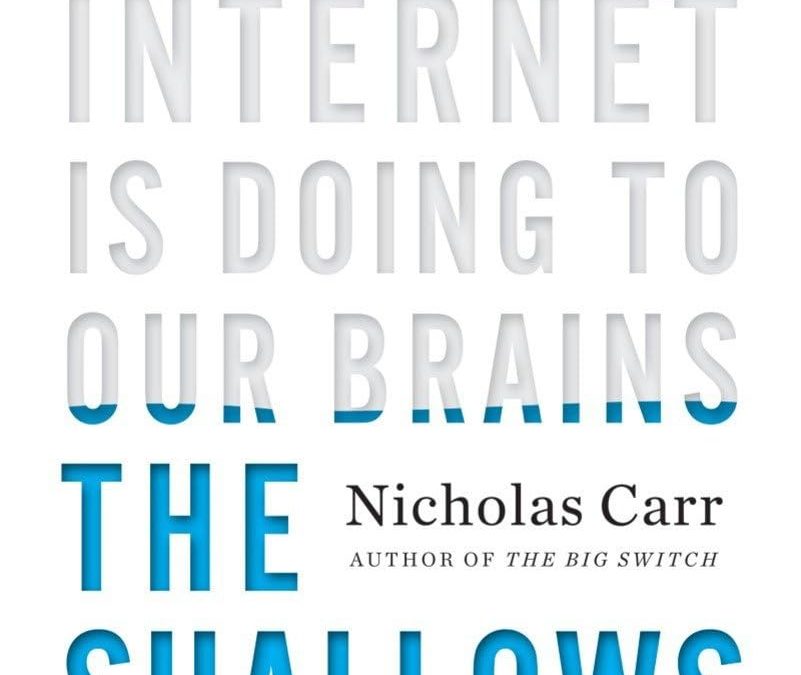How many tabs do you have open right now? While you’re reading this sentence, did you just glance at a notification on your phone? If this sounds familiar, then Nicholas Carr’s Pulitzer Prize-finalist book, The Shallows: What the Internet Is Doing to Our Brains, is not just a book you should read—it’s an experience that will make you acutely aware of your own reading habits.
Published over a decade ago, Carr’s thesis feels more urgent and relevant today than ever. This isn’t a nostalgic rant against technology. It’s a deeply researched, compelling, and frankly unsettling exploration of how the tools we use don’t just change our habits; they physically change our brains.
The Central Argument: Your Brain is Plastic, and the Internet is the Mold
Carr builds his case on the foundation of neuroplasticity—the brain’s remarkable ability to reorganize itself by forming new neural connections throughout life. Our brains are not hardwired; they are adaptable and shaped by our experiences and, crucially, by the tools we use.
He argues that every information technology, from the map to the clock to the printed book, fundamentally changed how we think and perceive the world. The book, for example, encouraged deep, linear, focused thought. It trained our brains to concentrate, to follow complex arguments, and to immerse ourselves in a world of ideas.
The internet, however, is a different beast entirely. Designed for efficiency and profitability, it encourages the exact opposite: distraction, skimming, and consumption. Its core mechanics—hyperlinks, notifications, endless scrolling, and a billion outbound paths—are engineered to interrupt us. We’ve become powerful drivers of an “info-gathering” vehicle, but we’re losing our capacity for deep contemplation and sustained attention.
Key Takeaways That Will Stick With You
- The Juggler’s Brain: Carr presents convincing evidence that we are not actually multitasking but rather “task-switching” at a frenetic pace. This constant shifting places a heavy cognitive burden on our brains, leading to mental fatigue and making it harder to form rich, dense memories (what psychologists call “long-term memory”).
- The Trade-Off: The internet is making us better at quick scanning and pattern recognition, but it’s making us worse at deep reading, critical thinking, and empathy. We’re gaining efficiency but losing depth. As Carr famously asked in his original Atlantic article, “Is Google Making Us Stupid?”
- The Unseen Cost: The book argues that by outsourcing our memory to search engines and our navigation to GPS, we are losing a fundamental part of our humanness. Personal memory and spatial awareness are not just storage drives; they are the frameworks upon which we build understanding and creativity.
The Verdict: A Vital and Uncomfortable Read
The Shallows is not a comfortable book. While reading it, you will become hyper-aware of your own urge to check your phone, your tendency to skim dense paragraphs, and the unsettling feeling that your brain is… different than it used to be. That discomfort is the point.
Carr is sometimes criticized for being too pessimistic and not offering a simple solution. But that’s not his goal. His goal is to sound an alarm, to make us conscious of the trade-offs we are making without our consent. He doesn’t advocate for abandoning the internet (an impossible task), but for developing a more mindful, intentional relationship with it.
Final Thoughts: More Than a Decade Later
Reading The Shallows in the 2025 is a different experience than when it was first published. The trends Carr identified have not just continued; they have accelerated exponentially. The rise of addictive social media algorithms, the 24/7 news cycle, and the constant pressure to be “online” have made his warnings even more prophetic.
The greatest takeaway today is that mindfulness is no longer optional; it’s a cognitive necessity. The book forces a crucial question: In an economy that prizes attention, who are we allowing to own ours? Carr doesn’t provide a pat answer, but he gives us the most important tool to find one: awareness. By understanding how our brains are being shaped, we can begin to make conscious choices—to put our phones away, to read a paper book, to take a walk without a podcast—and actively fight for the depth that makes us human.
This book is the first and most important step in that fight. It is the user manual for your attention in the digital age, and it’s one we all desperately need to read.
